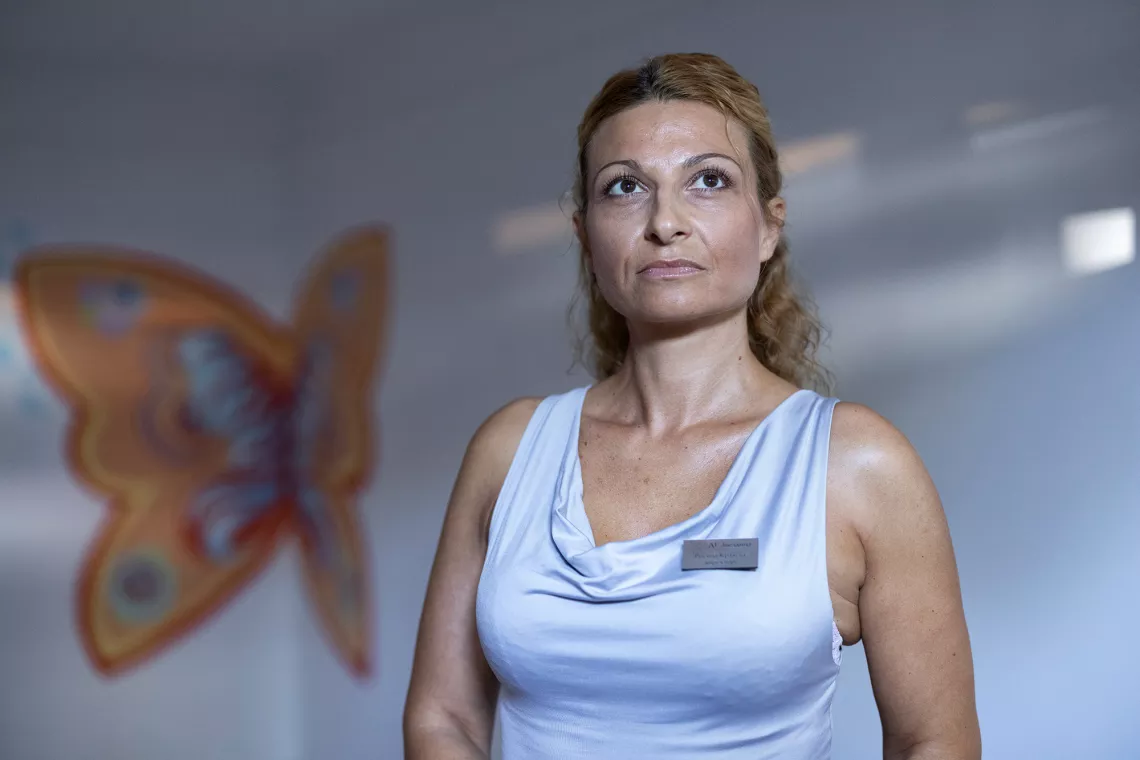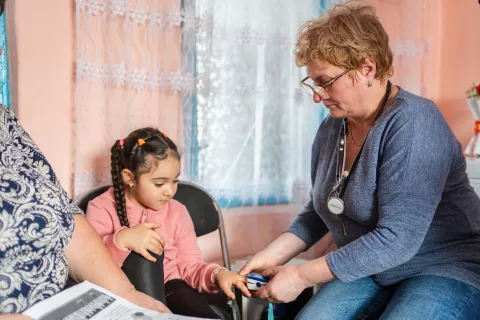Working together as a Team for Alex
How attending an inclusive kindergarten helps Alex thrive

In the glare of the Bulgarian sunshine 6 year old Alex walks alongside his mother on their way to the beach. Alex looks like any 6 year old might, curious and playful, sometimes running ahead of his mother as they make their way along the pier between the umbrellas laid out for today’s sunbathers. However, Alex has faced many challenges since his birth. Eight days after he was born he was diagnosed with hydrocephalus, a condition where fluid gathers on the brain. Life threatening if left untreated, Alex had to undergo five operations in quick succession. A shunt with a valve had to be placed in his head to drain the accumulating fluid to relieve the pressure in his brain. Today his mother Katya carefully monitors the functioning of the valve and is wary of activities that might cause him to knock his head and dislodge the valve.
“What worries me the most is the inability to predict when this valve will get blocked. Because every time it gets clogged at unexpected locations, once even during a vacation, and it is not everywhere we can get help”, she confides.
Help for Alex has proved hard to find in Burgas. When it came time to start kindergarten Katya visited many schools in the search for the specialist care she knew Alex would need. She eventually found it at this small kindergarten housed in an old building in the city center.
The constant rumble of traffic can be heard above the childrens’ playful shouts, but the yard is spacious, with greenery and many benches and slides. The basement space will soon become a sensory room. With limited resources from the state, Rositsa, the Kindergarten Director relies on independent fundraising through the engagement of the parents in the community to supply the much needed equipment.
In the classroom Alex is playing with a group of other children, some of them, like him, with special needs, others from the general community. The Director emphasizes that an integrated classroom benefits everyone.
“I think this is what integration is all about – accepting the different person.” Rositsa says, “Children are totally accepting of their peers with special needs. They love to help them, to involve them in their games and in the educational process, especially the more challenging parts of the process. I think the community is becoming more and more understanding.”
Desislava is the single specialist resource teacher at the kindergarten. She recognizes the importance of working together as a community.

“The real inclusion of the child can only happen if we all work as a team. Starting with the family, continuing with the regular teachers, through the resource specialists, the non-pedagogical staff, that is, everyone.”
There is a growing number of children who need specialist attention as Rositsa explains.
“We started with just three children with special needs and currently we have thirteen.
“I would like to make sure we have a psychologist, a resource teacher and a speech therapist that are permanently part of our staff here, as the number of children with special needs is increasing.”
But finding the specialist staff is challenging, both due to funds and the complicated administrative process.

“Dedicated budgets limit us in terms of hiring specialists on a permanent basis. We need to have at least ten children with special educational needs in order to afford hiring such specialists, but this number may change. One year we have ten children and the next we may have three or four. Ten or more provide sufficient budget for hiring specialists, less than ten means we can’t afford it.”
Desislava laments the lack of materials, particularly with the increasing prevalence of autism and nonverbal children.
“Standard equipment rooms are now widely used, which can be used by children with different diagnoses. Different materials are provided in these rooms, but when a nonverbal child comes, we do not have an alternative way of communication.”
The European Union Child Guarantee pilot program, supported by UNICEF, recognizes these challenges and aims to address this through introducing early childhood intervention and inclusive pre-school education services in Bulgaria. By increasing the numbers of support staff and specialists – such as resource teachers, psychologists, and speech therapists - in integrated classrooms, by providing methodological support and training on inclusive practices to kindergarten staff, by promoting the increased use of assistive technologies for complementary and alternative communication, by encouraging teamwork between the parents and the specialist staff, and providing specific environmental materials catering to the children’s ways learning, it is hoped that all children will thrive in these early years and that social attitudes towards them will change.
There are 30 participating kindergartens in the EU Child Guarantee program but because it is only in a pilot phase it means that potential staff are hesitant about taking a position that may be only short term.
Rositsa confides, “Colleagues would come and ask how long this current project is running and I say till next summer, and they hesitate. I can’t promise a permanent position and they get nervous about their future prospects. They want a permanent job.”
For Alex, now in his fourth year at the kindergarten, the support and help he has found here has been life changing. Next year he will be leaving kindergarten and starting school.

The Director confirms, “Over the past three years Alex has achieved so much and the tests are showing he now complies with the state educational norms. He is ready for school.”
For Katya, Alex’s mother, she feels much gratitude and only wishes the support her son has received could be available to all children.
“It will be very good if we can see more acceptance by the teachers and principals in kindergartens and schools for these children and if it becomes the standard to make these children feel accepted at any educational institution.”





